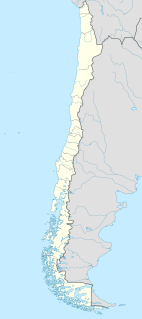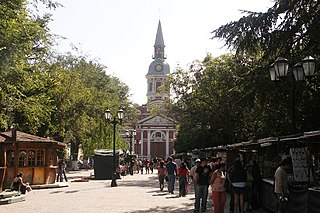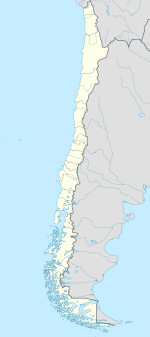
Parral is a city and commune in the Linares Province of Chile's Maule Region.

Linares is a Chilean city and commune located in the Maule Region and lies in the fertile Chilean Central Valley, 303 km (188 mi) south of Santiago and 50 km (31 mi) south of Talca, the regional capital. Linares is the capital city of the province of Linares.

Lo Espejo is a commune of Chile located in Santiago Province, Santiago Metropolitan Region. It has the country's largest population density.

Talca is a city and commune in Chile located about 255 km (158 mi) south of Santiago, and is the capital of both Talca Province and Maule Region. As of the 2012 census, the city had a population of 201,142.

San Fernando is the capital of the province of Colchagua, in central Chile, and the second most populated urban center of the O'Higgins Region. Located close to the Tinguiririca River in a fertile valley, San Fernando sits 339 m above sea level. Founded in 1742, it became the provincial capital in 1840.

Cauquenes, a city and commune in Chile, is the capital of the Cauquenes Province and is located in the Maule Region.

Constitución is a city and commune of Talca Province, Maule Region, Chile. It was historically a popular seaside resort. However, following the growth of the industrial sector tourism has since declined. Constitución is minor port in Chile.

San Javier is a Chilean city and commune located in the Province of Linares, Maule Region. The city lies in the geographical center of the country, some 270 km (168 mi) south of Santiago, 31 km (19 mi) to the northwest of the provincial capital, Linares, and 24 km (15 mi) to the south of Talca, the regional capital. The Pan-American Highway passes through the commune of San Javier, touching tangentially the eastern side of the town. A paved road connects San Javier with Colbún, Colbún dam lake and Panimávida and Quinamávida hot springs.

Chanco is a Chilean town and commune located in Cauquenes Province, Maule Region.

Colbún is a Chilean town and commune in Linares Province, Maule Region. The commune has a population of over 17,000 inhabitants and covers an area of 2,900 km2 (1,120 sq mi), making it the province's largest. Its capital, the town of Colbún, has 3,679 inhabitants. It is 7 km (4 mi) west of the center of continental Chile.

Yerbas Buenas is a Chilean town and commune in Linares Province, Maule Region. It lies in the geographical center of the country, on the fertile central plain, some 300 km (186 mi) south of the national capital of Santiago, 50 km (31 mi) south of Talca, the regional capital and 12 km (7 mi) north of Linares, the provincial capital.

San Clemente is a city and commune administered by the municipality of San Clemente, located in the Talca Province of Chile's Maule Region.

Curepto is a town and commune in the Chilean Province of Talca, located in the VII Maule Region. The commune spans an area of 1,073.8 km2 (415 sq mi).

Pencahue is a town and commune in Chile, located in Talca Province, in the seventh region of Maule. The commune spans and area of 956.8 km2 (369 sq mi).

Empedrado is a town and commune in the Talca Province of Chile's Maule Region.

Río Claro is a commune of the Talca Province in Chile's Maule Region. The municipal seat is the town of Cumpeo. The Claro River valley is an affluent community.

Pelarco is a town and commune in Talca Province, Maule Region of Chile. The commune spans an area of 331.5 km2 (128 sq mi).

San Rafael is a town and commune of the Talca Province in the Maule Region of Chile. The town serves as the communal capital.

El Monte is a Chilean city and commune in Talagante Province, Santiago Metropolitan Region. As of 2007, it had a population of 29,568.

The Ramal Talca-Constitución, also known as the Ramal de Maule is the last remaining narrow-gauge ramal in Chile. Its 88-kilometre (55 mi) route follows the north bank of the Maule River and crosses the communes of Talca, Maule, Pencahue and Constitución, with Constitución the last station on the line. The route features views of the Andean foothills and the Pacific Ocean. The line can support a speed of 50 miles per hour (80 km/h). The railway is facing closure due to inactivity and an increased preference for private transport.














